July Passenger Vehicle Market Review
The passenger car market in July was basically consistent with the expectation of the CCC, with a larger negative growth from the previous month, and the auto market still followed normal fluctuation rules. Although Guiyang City announced the restriction on July 11th, there were a few fearful car purchases in large and medium-sized cities, and the Japanese company’s production capacity was further recovered. The chain’s wholesale sales increased by 13.8%, and dealers queued up to buy cars. The month basically got the car, but did not resist the shrinking sales in the terminal market. Due to the above two special circumstances, the number of narrow-sale passenger vehicles in July increased by 11% year-on-year, while domestic retail sales only increased by about 8% year-on-year. Due to the already high inventory of cars, the number of manufacturers that released high-temperature fakes in July increased, which reduced the production and wholesale of passenger cars and reduced the inventory of dealers. However, the inventory of Japanese passenger cars increased rapidly. maintain. At the same time, there are no signs of diminishing market unfavorable factors, indicating that the passenger car market in the near future is still not optimistic.
August passenger car market estimates
Although the market is not expected to be optimistic, there are 23 working days in August, which is the highest number of months on calendar days and work days. There are fewer companies that have high fever and can produce and wholesale more cars. But August is the hottest month. Buying a car at this time can be very sinful. There are factors that reduce terminal sales. However, near the end of the month, when the weather begins to turn cooler, and it is close to school, young parents will pay close attention to buying and picking up children. The passenger car, as well as the gold market before September, will be warmed up in advance, and sales will increase at the end of the month. The recent oil price has been fluctuating sharply and continues to perturb the determination of some potential users to buy. Therefore, in August, the number of domestic retail sales of narrow passenger vehicles will increase, but the year-on-year growth rate will further decrease.
Domestic sales in July
July wholesale sales table
2005-2010 monthly sales of passenger cars (car/MPV/SUV)
Narrow passenger vehicle manufacturer sales ranking (July domestic sales consolidated number)
Narrow Passenger Vehicle Manufacturer Sales Rank (July Domestic and Foreign Sales Wholesale Number)
General Motor Vehicle Manufacturer Sales Rank (July Domestic Sales Consolidated Number)
General Motor Vehicle Manufacturer Sales Rank (July Domestic and Foreign Sales Wholesale Number)
Deterioration of Living Environment of Domestic-funded Automobile Enterprises
According to the statistics of the Federation of Travel Unions, the market share of narrow-minded passenger cars of its own brand in the first half of last year was 33%, which was reduced to 32.2% this year, and the market share of self-owned brand cars in the first half of the year was lower than that of the same period of last year, due to independent brands. Is the main force of exports, the domestic market share of sales, the first half of last year was 30.5%, fell to less than 29% in the first half of this year. Many disaster-prone domestic-funded passenger vehicle companies have historical roots: At the beginning of the 1980s, the domestic market share of passenger cars was as high as 100%. At that time, the central government ordered the suspension of production of red flag sedan to Mercedes-Benz, causing the disappearance of self-owned brand vehicles. The brand image has plummeted. Since opening up is the most favorable for foreign auto oligarchs, followed by the joint venture climax of auto companies, major groups basically put a joint venture between passenger car factories and foreign companies, and the market share of foreign brands of passenger cars continues to expand. By the beginning of the 21st century, some small private companies and The rapid growth of state-owned car companies, the past eight years the market share of the independent brand passenger car slowly increased, but the lack of strategy to speed up the development of the national automobile industry, the market share of independent brands from this year began to decline. In order to change this situation, there is no savior at present, and it can only rely on the domestic enterprises' own hard work.
The reasons for the recent decline in the self-owned brand market are: 1. The following 1.6-liter passenger vehicle purchase tax concession is cancelled; 2. The travel tax increases the preferential emission from 1.6 liters to 2 liters; 3. The joint venture product presses down to make its own brand The market share of A0 sedans and SUVs has dropped sharply; 4. The capacity of joint ventures has recently increased, squeezing into the self-owned brand car market; 5. The negative reports on self-owned brand cars are overwhelming, degrading the image of independent brands; 6. The Chinese government encourages The policy on the purchase and use of small-displacement automobiles has so far had no substantive content, resulting in the shrinking of the passenger car market below 1.3 liters; 7. The nation’s self-confidence and cohesion are low, and it is serious for foreign fans; 8. The state-owned auto group has its own brand. Since it was late, it has not yet formed a climate. 9. In recent years, the technology and quality of automotives from main brands have progressed rapidly. The technical quality of some new vehicles has surpassed that of some joint ventures, but users do not know; 10. The government adopts independent brands to buy products. The proportion of vehicles used is less than 10%; 11. Future policy trends have many unfavorable factors for self-branded products, such as changes in standards and subsidies for energy-saving vehicles. Encouraging "independent joint venture" brands. 12. The restrictive licensing policy of big cities has caused the independent brands to be the first to be squeezed. 13. The trend of large-scale products has become the mainstream of the market, and the number of self-owned branded car groups has practically been reduced. Therefore, the next few years will be the hardest and most critical period for domestic-funded auto companies!
The impact of the purchase of Guiyang is huge
On July 11th, the Guiyang municipal government announced the restrictions on the use of motor vehicles. Guiyang became the second city in which to shake cars, and Guiyang, as a third-tier city in the western most economically underdeveloped provinces, has significant implications for its purchase restrictions. After the Guiyang purchase restriction order is not cancelled three months later, it will push down the "domino" and the automobile purchase restriction will spread in the first, second and third tier cities, seriously affecting the government's image and people's hearts. When Shanghai restricted the purchase of automobiles for more than a decade, traffic has become increasingly blocked. This is because before the amount of car ownership is basically saturated, the restriction cannot reduce the amount of ownership, but only slows the growth of car ownership. In developed countries, most cities with a population of more than one million cannot solve traffic jams and purchases are not implemented. It can be seen that restrictions on purchases are unscientific land policies. The local governments that issued restrictions on purchases have pledged to stop the blockage, and the measures taken have been eventually overstepped. The essence of the restriction is to boycott the automobile transformation society, which shows that the concept of the government runs counter to the trend of social development. The international practice of governance is to continuously increase the fuel tax, forcing owners to consciously limit the frequency of car use to slow down traffic jams and fuel savings, and to regulate the growth of the automobile market.
Used car market should be thoroughly reformed
In the early days of reform and opening up, some people brainwashed leaders and said: To take the road to a market economy, we must cultivate brokers. The country decided to make a pilot in the start-up used car market. Foreign brokers are attached to enterprises and can only act as intermediaries and cannot engage in operations. But at that time, there were very few used car dealers and so many brokers were required. The expedient measure allowed business registration of “brokers†and the establishment of used car brokerage companies. As a result, they became the owners of second-hand car owners, instead of being agents. This abnormal phenomenon has continued until now! Moreover, in the service industry, which has the most favorable taxes and fees, the used car market with an annual turnover of more than 100 billion yuan, the country’s annual tax revenue is only more than 100 million yuan, and at least hundreds of multimillionaires have been created in more than a decade. There have also been problems such as triad land grabs. After many years of rectification, although the market environment has improved, but all used car trading countries have almost received no value-added tax, at least lost more than 2 billion yuan in tax revenue every year, but also used car sales. The company has shrunk, so the country’s used car market policy should be thoroughly reformed.
If at that time it was to prop up self-employed individuals, now that they have enough funds to start enough second-hand car sales companies, the reform should be based on international practice. Instead, all used car dealerships should be replaced by used car sales companies. Brokers can only Attached to second-hand car sales companies, to fundamentally eliminate the chaos in the used car market. And to restore the tax rate of used car VAT from 2% to 4%, which is also the lowest tax rate in the service industry. The second reform should be a group purchase made by a car main engine plant, and if the replaced vehicles are sold to second-hand car sales companies for tax exemption, the used car sales companies' car sources will be increased, because the main car factory deals with replacement used cars. The third reform is based on international practices and domestic real estate policies. For those who sell used cars, a certain percentage of business tax is levied on them, which is issued by the taxation department using special invoices as the basis for other taxes and fees and the cancellation of car registration. Since selling cars cannot have tax exemptions, the tax rate should be given a certain discount. This is the most critical three things in the reform of the used car market policy.
The passenger car market in July was basically consistent with the expectation of the CCC, with a larger negative growth from the previous month, and the auto market still followed normal fluctuation rules. Although Guiyang City announced the restriction on July 11th, there were a few fearful car purchases in large and medium-sized cities, and the Japanese company’s production capacity was further recovered. The chain’s wholesale sales increased by 13.8%, and dealers queued up to buy cars. The month basically got the car, but did not resist the shrinking sales in the terminal market. Due to the above two special circumstances, the number of narrow-sale passenger vehicles in July increased by 11% year-on-year, while domestic retail sales only increased by about 8% year-on-year. Due to the already high inventory of cars, the number of manufacturers that released high-temperature fakes in July increased, which reduced the production and wholesale of passenger cars and reduced the inventory of dealers. However, the inventory of Japanese passenger cars increased rapidly. maintain. At the same time, there are no signs of diminishing market unfavorable factors, indicating that the passenger car market in the near future is still not optimistic.
August passenger car market estimates
Although the market is not expected to be optimistic, there are 23 working days in August, which is the highest number of months on calendar days and work days. There are fewer companies that have high fever and can produce and wholesale more cars. But August is the hottest month. Buying a car at this time can be very sinful. There are factors that reduce terminal sales. However, near the end of the month, when the weather begins to turn cooler, and it is close to school, young parents will pay close attention to buying and picking up children. The passenger car, as well as the gold market before September, will be warmed up in advance, and sales will increase at the end of the month. The recent oil price has been fluctuating sharply and continues to perturb the determination of some potential users to buy. Therefore, in August, the number of domestic retail sales of narrow passenger vehicles will increase, but the year-on-year growth rate will further decrease.
Domestic sales in July
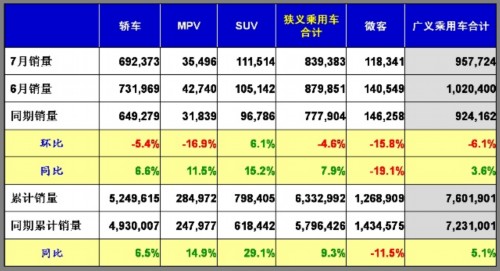
July wholesale sales table
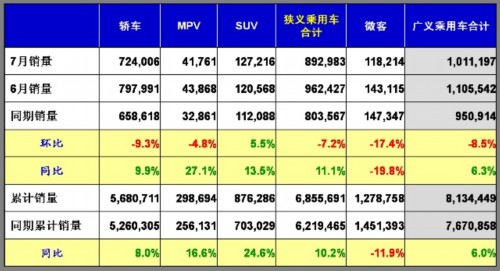
2005-2010 monthly sales of passenger cars (car/MPV/SUV)
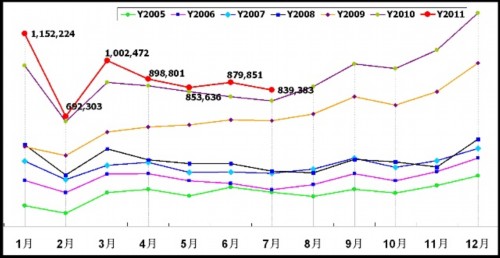
Narrow passenger vehicle manufacturer sales ranking (July domestic sales consolidated number)
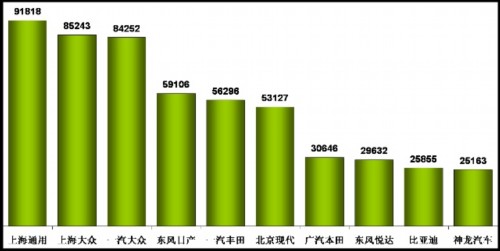
Narrow Passenger Vehicle Manufacturer Sales Rank (July Domestic and Foreign Sales Wholesale Number)
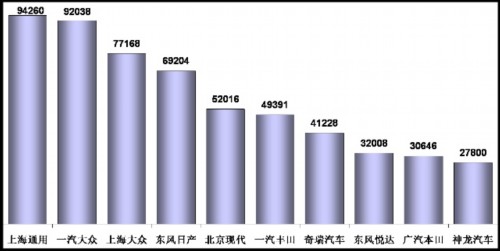
General Motor Vehicle Manufacturer Sales Rank (July Domestic Sales Consolidated Number)
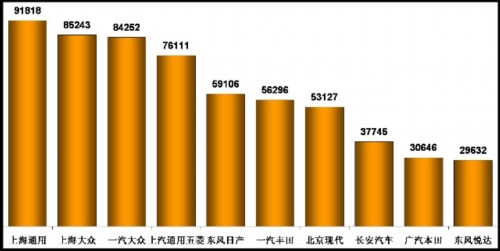
General Motor Vehicle Manufacturer Sales Rank (July Domestic and Foreign Sales Wholesale Number)
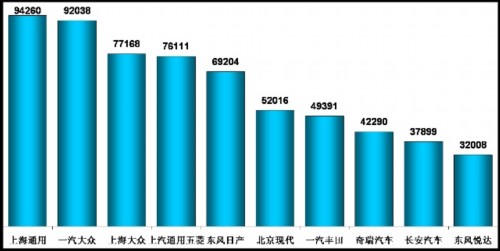
Deterioration of Living Environment of Domestic-funded Automobile Enterprises
According to the statistics of the Federation of Travel Unions, the market share of narrow-minded passenger cars of its own brand in the first half of last year was 33%, which was reduced to 32.2% this year, and the market share of self-owned brand cars in the first half of the year was lower than that of the same period of last year, due to independent brands. Is the main force of exports, the domestic market share of sales, the first half of last year was 30.5%, fell to less than 29% in the first half of this year. Many disaster-prone domestic-funded passenger vehicle companies have historical roots: At the beginning of the 1980s, the domestic market share of passenger cars was as high as 100%. At that time, the central government ordered the suspension of production of red flag sedan to Mercedes-Benz, causing the disappearance of self-owned brand vehicles. The brand image has plummeted. Since opening up is the most favorable for foreign auto oligarchs, followed by the joint venture climax of auto companies, major groups basically put a joint venture between passenger car factories and foreign companies, and the market share of foreign brands of passenger cars continues to expand. By the beginning of the 21st century, some small private companies and The rapid growth of state-owned car companies, the past eight years the market share of the independent brand passenger car slowly increased, but the lack of strategy to speed up the development of the national automobile industry, the market share of independent brands from this year began to decline. In order to change this situation, there is no savior at present, and it can only rely on the domestic enterprises' own hard work.
The reasons for the recent decline in the self-owned brand market are: 1. The following 1.6-liter passenger vehicle purchase tax concession is cancelled; 2. The travel tax increases the preferential emission from 1.6 liters to 2 liters; 3. The joint venture product presses down to make its own brand The market share of A0 sedans and SUVs has dropped sharply; 4. The capacity of joint ventures has recently increased, squeezing into the self-owned brand car market; 5. The negative reports on self-owned brand cars are overwhelming, degrading the image of independent brands; 6. The Chinese government encourages The policy on the purchase and use of small-displacement automobiles has so far had no substantive content, resulting in the shrinking of the passenger car market below 1.3 liters; 7. The nation’s self-confidence and cohesion are low, and it is serious for foreign fans; 8. The state-owned auto group has its own brand. Since it was late, it has not yet formed a climate. 9. In recent years, the technology and quality of automotives from main brands have progressed rapidly. The technical quality of some new vehicles has surpassed that of some joint ventures, but users do not know; 10. The government adopts independent brands to buy products. The proportion of vehicles used is less than 10%; 11. Future policy trends have many unfavorable factors for self-branded products, such as changes in standards and subsidies for energy-saving vehicles. Encouraging "independent joint venture" brands. 12. The restrictive licensing policy of big cities has caused the independent brands to be the first to be squeezed. 13. The trend of large-scale products has become the mainstream of the market, and the number of self-owned branded car groups has practically been reduced. Therefore, the next few years will be the hardest and most critical period for domestic-funded auto companies!
The impact of the purchase of Guiyang is huge
On July 11th, the Guiyang municipal government announced the restrictions on the use of motor vehicles. Guiyang became the second city in which to shake cars, and Guiyang, as a third-tier city in the western most economically underdeveloped provinces, has significant implications for its purchase restrictions. After the Guiyang purchase restriction order is not cancelled three months later, it will push down the "domino" and the automobile purchase restriction will spread in the first, second and third tier cities, seriously affecting the government's image and people's hearts. When Shanghai restricted the purchase of automobiles for more than a decade, traffic has become increasingly blocked. This is because before the amount of car ownership is basically saturated, the restriction cannot reduce the amount of ownership, but only slows the growth of car ownership. In developed countries, most cities with a population of more than one million cannot solve traffic jams and purchases are not implemented. It can be seen that restrictions on purchases are unscientific land policies. The local governments that issued restrictions on purchases have pledged to stop the blockage, and the measures taken have been eventually overstepped. The essence of the restriction is to boycott the automobile transformation society, which shows that the concept of the government runs counter to the trend of social development. The international practice of governance is to continuously increase the fuel tax, forcing owners to consciously limit the frequency of car use to slow down traffic jams and fuel savings, and to regulate the growth of the automobile market.
Used car market should be thoroughly reformed
In the early days of reform and opening up, some people brainwashed leaders and said: To take the road to a market economy, we must cultivate brokers. The country decided to make a pilot in the start-up used car market. Foreign brokers are attached to enterprises and can only act as intermediaries and cannot engage in operations. But at that time, there were very few used car dealers and so many brokers were required. The expedient measure allowed business registration of “brokers†and the establishment of used car brokerage companies. As a result, they became the owners of second-hand car owners, instead of being agents. This abnormal phenomenon has continued until now! Moreover, in the service industry, which has the most favorable taxes and fees, the used car market with an annual turnover of more than 100 billion yuan, the country’s annual tax revenue is only more than 100 million yuan, and at least hundreds of multimillionaires have been created in more than a decade. There have also been problems such as triad land grabs. After many years of rectification, although the market environment has improved, but all used car trading countries have almost received no value-added tax, at least lost more than 2 billion yuan in tax revenue every year, but also used car sales. The company has shrunk, so the country’s used car market policy should be thoroughly reformed.
If at that time it was to prop up self-employed individuals, now that they have enough funds to start enough second-hand car sales companies, the reform should be based on international practice. Instead, all used car dealerships should be replaced by used car sales companies. Brokers can only Attached to second-hand car sales companies, to fundamentally eliminate the chaos in the used car market. And to restore the tax rate of used car VAT from 2% to 4%, which is also the lowest tax rate in the service industry. The second reform should be a group purchase made by a car main engine plant, and if the replaced vehicles are sold to second-hand car sales companies for tax exemption, the used car sales companies' car sources will be increased, because the main car factory deals with replacement used cars. The third reform is based on international practices and domestic real estate policies. For those who sell used cars, a certain percentage of business tax is levied on them, which is issued by the taxation department using special invoices as the basis for other taxes and fees and the cancellation of car registration. Since selling cars cannot have tax exemptions, the tax rate should be given a certain discount. This is the most critical three things in the reform of the used car market policy.
Decorative Ceiling Fan Without Light
This Ceiling Fan is including not only modern ceiling fan without light, but also classical ceiling fan without light. What's more, this ceiling fan will not disturb daily life because it has silent motor and remote control make sure control will be more simple. This ceiling fan will make places more beautiful.
Decorative Ceiling Fan Without Light,Decorative Ceiling Fan With Blades,No Light Decorative Ceiling Fan,Ceiling Fan Ornaments
ZHONGSHAN UFAN ELECTRIC APPLIANCE CO. LTD , https://www.uflightceilingfan.com